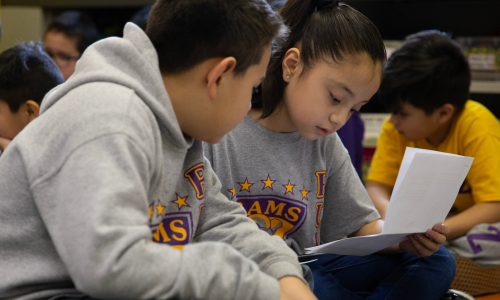
We’ve got a big problem in math education and people are struggling to solve it. Student performance is declining, teachers are overwhelmed, professional development is lacking, and researchers and policymakers are at odds. This math problem looks different to everyone, and it can come down to academic identity.
To educators, low student performance and post-pandemic declines in grade-level readiness are major challenges in the math classroom. To students, not having teachers who can help them understand why they are learning math or help them draw connections between math and other subjects in school is problematic. To families, the “new math” and doing math problems differently than we did back in the day makes it almost impossible to help students with homework. To researchers, math problems are so complex that they think we need to oversimply math to a procedural subject devoid of conceptual understanding or real-world application. To policymakers, racial, ethnic, gender, and socioeconomic inequities are key factors that inhibit students’ potential to advance in mathematics.
There are too many factors in this math problem! The overwhelming amount of challenges we perceive about math education is making a very simple problem in math feel like high-level differential calculus. It’s no wonder people want to throw in the towel and just go back to the way we used to teach math. But how will we help students move forward if we move backward?
Solving this complex problem becomes easier when you break it down to the one thing that all students are not receiving and not all teachers are equipped to give: high-quality teaching. Academic success hinges on that. The cause can often be as simple as a teacher’s academic identity.
Too many of us aren’t math people
If we are all working toward improved student performance, then academic success should be a nonnegotiable goal for students, teachers, and others. But it’s not. And that’s because most of us are ok with not being a math person.
Understanding your math academic identity can help you get closer to determining whether you truly believe that math academic success can be a nonnegotiable goal for all students.
Stop for a moment and ask yourself: are you a math person? Now think of five other people you know. How many of them would say they are a math person? These “not math people” are getting in the way of our students making progress. A mindset of “not being a math person” is part of your academic identity, and it’s limiting because it can make you more diffident about your intellectual capabilities, fall victim to thinking of math as a linear and procedural science, and blind you to seeing the beauty in conceptual reasoning and explorative thinking.
Some of these non-math-people are teaching our students right now, and that is creating a different problem: unhealthy math academic identities. We all have academic identities, which are our attitudes, beliefs, and dispositions toward a subject. Unhealthy academic identities can manifest as disengaged students in class, more behavior problems, a teacher’s inability to move students’ math scores, and a lot more non-math people.
Imagine a fifth-grade teacher confidently affirming that they are not a math person. What might teaching and learning look like in their classroom? Will all students have access to mathematical thinking and opportunities to be intellectually curious students of mathematics? Will that teacher only teach the curriculum?
When we limit a student’s ability to develop sound mathematical thinking and reasoning, we are putting them at a disadvantage. Bill Gates was right in saying that we need to increase funding for teacher professional development, but all of our efforts will be in vain if we do not change how we think about math teaching and learning as well.
Answering this one question is the solution
A lot of us are not math people because we didn’t have the best experiences with math as young learners. Society has made “illiteracy in math acceptable the way illiteracy in reading is unacceptable,” as the late Bob Moses, founder of The Algebra Project and co-author of Radical Equations, said.
But what is possible if we all believe that math academic success is a nonnegotiable goal for all students? We can’t truthfully answer that question without uncovering our own beliefs about math by answering questions such as, how did I feel about math class as a student? Did I like or dislike it? Why did I feel that way? What did it mean to be a successful math student when I was in elementary school? Who were the successful math students? How did I know I was successful? What types of grades did I get in math? Why? What do I remember teachers or other adults saying about my capabilities as a math student?
Teachers’ academic identities are continuously developed through professional development workshops and other collaborative learning spaces.
The answers to all of these questions comprise the ideas and beliefs you hold about math teaching and learning: your math academic identity. Understanding your math academic identity can help you get closer to determining whether you truly believe that math academic success can be a nonnegotiable goal for all students.
Math is for everyone
Math shouldn’t be the gatekeeper subject that excludes students because some of us deem math success capable by only a select few. Math is for everyone. A fellow friend and math educator, Anita Brown, shared an insightful analogy: “Consider a situation where you offer two people a gift of anything they want. The first person asks for something that costs $50 and the other person asks for something that costs $2,000. The first person limited their cost option because they couldn’t imagine that there was more money available. People who are accustomed to having very little are used to making do with very little. Therefore they have limited their expectations.”
Just as our mindsets can shift from a fixed to a growth mindset, or from deficit- to asset-based, so, too, can our academic identities grow. Academic identities are not fixed; they are constantly being shaped and developed. Sometimes that happens when students open our eyes to new ways of thinking about a math problem. More often than not, teachers’ academic identities are continuously developed through professional development workshops and other collaborative learning spaces. It is imperative that educators continue to expand their academic identities and develop more empowering beliefs about math teaching and learning.
The equity expression
In closing, I’d like to offer you a bit of hope. For the first half of my life I wasn’t a math person, but now I am.
As a young student, I was consistently an average performer in math classes and never felt that my teachers understood my ways of thinking about and doing math. Nonetheless, I received my BS in math and an MEd in instructional leadership, and today I celebrate a successful 20-year career as a middle grades math teacher, math specialist, instructional coach, math workshop designer, and facilitator.
The challenges we face in math education are issues of equity, which I address in my book The Equity Expression: Six Entry Points for Nonnegotiable Academic Success. For those committed to helping students succeed, the steps outlined in this book provide meaningful solutions to embed equity into every learning culture. Check it out, and you’ll be better equipped to answer the question, what’s possible when math academic success is a nonnegotiable goal for all students? The possibilities are endless.







